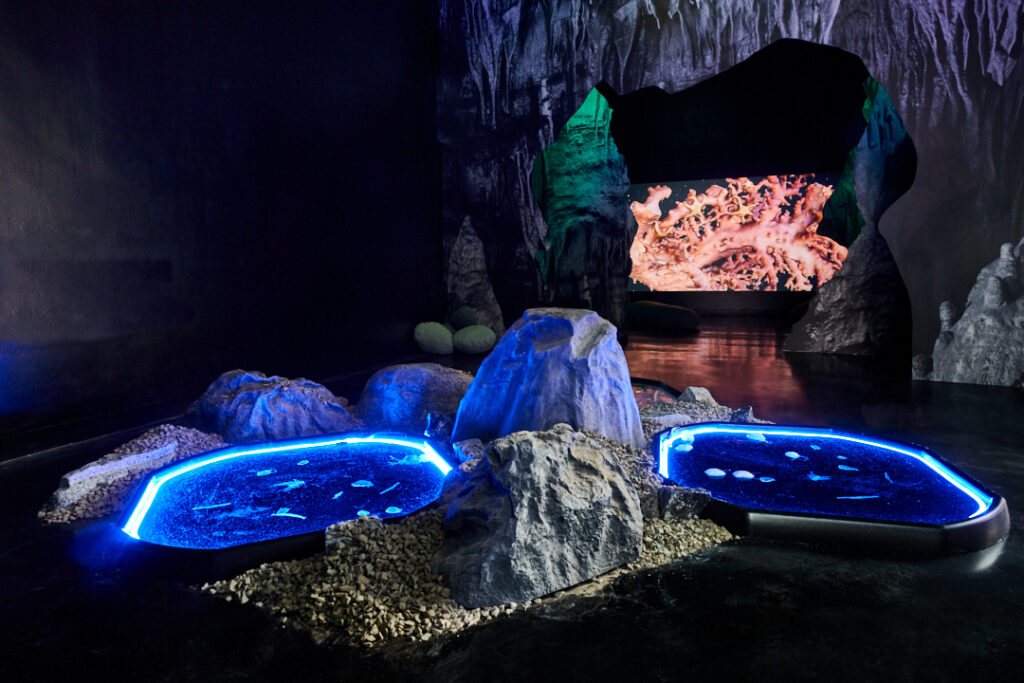Who narrates the story determines its representations. History is most often narrated from a patriarchal and colonial viewpoint, which influences present collective consciousness and social constructs such as gender and race. Danielle Brathwaite-Shirley and Josèfa Ntjam subvert the traditional narrative in their exhibition at FACT Liverpool. Both artists take the viewer on an immersive journey to explore the stories of under- and misrepresented groups through installation, sculpture, sound, film and gaming, creating transformative worlds that, whilst acknowledging the past, create alternative possibilities for the future.
Danielle Brathwaite-Shirley has worked in collaboration with Liverpool-based youth group The Bandidos to reimagine the city of Liverpool and produce a game and corresponding installation environment, ‘When Our Worlds Meet’ (2022). The exhibition at FACT Liverpool acts as a physical representation of the game, with the viewer able to interact with it in a physical space. On entering the installation the viewer is first met by the terms and conditions of the game world, represented in the form of a bus shelter. Here the intentions of the game/installation are set: an exploration of identity, the self and societal differences, that might challenge your views and make you feel uncomfortable. The installation then offers the choice to proceed. This sense of choice becomes a key feature of the work. Proceeding, viewers are met with a darkened exhibition space filled with inner-city architecture. Hanging within the gallery are banners depicting the avatars featured in the game, reminiscent of character choice within a game set up. The space is split into the four interactive chapters of the virtual game: Dystopian Portal, Meat World, Fun World and Castle x Communist. Each section has an interactive monitor allowing the viewer to play the digital version of the game’s chapter in the exhibition space, further connecting the virtual world of the game to the physical gallery space. ‘Castle x Communist’, for example, is set up as a living room with a sofa and coffee table. Referring to ideas of home suggests that this is a safe place in which to exist as your true self. Across the game’s various ‘Houses’, such as the ‘Communist House’ and ‘Venus Colony’, the viewer is invited to imagine genderless worlds and explore the possibilities of dissolving patriarchal systems to create a world of broader representation and gender-inclusiveness.

Each chapter offers the viewer a chance to interact with the avatars through a series of choices and questions with variable outcomes, allowing them to navigate the often hard discussions of the exhibition around exploitation, colonialism, and identity, and to question the rules and systems our society has created. Having played the game at home and in the installation, I feel the installation creates a more intimate encounter than a usual game experience could. By introducing the virtual world through a physical manifestation, it makes the viewer confront the game world from a deeply personal perspective, taking us on an immersive journey to question social constructs and our own identities.
Josèfa Ntjam’s exhibition ‘When the moon dreamed of the ocean’ (2022) combines photomontage, film and installation to take viewers on a journey to a futuristic world dissociated with time. Through displacement of time in space the installation disengages with fixed identities and systems, and through its interstellar hybrid lifeforms in a surrealist underwater cave, the installation inverts the hegemonic representation and classification of colonial history. Ntjam examines the aftermath of colonialism and the transatlantic slave trade and re-appropriates its history, retelling it through personal stories as an act of resistance.
Ntjam’s photomontage acts as an entrance to the cave and introduces the themes and symbols explored within the installation. This combines images of Nigerian warriors, civil rights freedom fighters, Black Lives Matter protests, marine organisms, and mythological figures such as Mami Wata the water goddess, revered by West, Central and Southern African cultures and those displaced by the transatlantic slave trade. Ntjam works with archives and research to present an alternative narrative to the colonial stance, and the historical images share a sense of resistance with the development of underground movements as catalysts for change and transformation. These ideas of adaptability and transformation are echoed in Ntjam’s interest in the natural worlds of mushrooms and marine microbiology that feature throughout the work. These organisms repurpose decayed material that are no longer a vital resource, a key theme in her work of re-appropriation. Mushrooms, and their use of a mycelial system, can represent networks of resistance fighters in the formation of underground networks, forming a collective to transform an idea (or, in the case of a mushroom, material) that no longer serves a purpose.
The rock pools within Ntjam’s cave perfectly embody this. The pools of water contain both digital and sculptural plankton who carry archives and memories of the Cameroon War, which are understood to be too contentious and traumatic to address in the present. The work suggests that these lifeforms will act as custodians of the data, and that by being shared amongst the plankton across time and distance they will fragment, becoming released from the burden of history to grow into new forms and possibilities.

Water is a reccurring theme within the exhibition in its duality as a restorative and destructive force. It references the transatlantic journey of migration and slave trade in which identities and origins are dispersed across the globe. Housed in the cave is Ntjam’s film ‘Dislocation’ (2022), which explores the recurring contexts of transformative restoration within micro lifeforms and water droplets. The film incorporates a narrative of dislocated memories and stories, highlighting the colonial effects, from the transatlantic slave trade to the war in Cameroon, on histories that have been suppressed and distorted by western ideology. Such suppression has led to the hegemonic positioning of race and identity which prevail today, but it is these perspectives the installation dismantles. In its creation of alternative worlds, it offers the chance to exist in a world not bound by colonialism.
This exhibition is the final instalment of FACT Liverpool’s ‘Radical Ancestry’ programme which explores how history, geography, biology and culture shape our ancestral history and questions how technology can help us to explore new perspectives and explore our identities. Both Brathwaite-Shirley and Ntjam engage with these themes by using technology to challenge fixed interpretations of identities that have been influenced by history, and through their creation of alternative futuristic worlds in the gallery space. By inviting interaction with the installation, Brathwaite-Shirley offers the chance to confront how history has impacted contemporary viewers both personally and societally, and to consider how new models of thinking can aid better representation of marginalised groups. Ntjam, similarly, allows us to become part of the transformative journey to an emancipated future world through engagement with the different elements of the installation. As a whole, the exhibition invites us to consider new models of thinking through acts of resistance, and suggests that repurposing old ideologies can allow us to re-imagine a more inclusive world.
Danielle Brathwaite-Shirley and Josèfa Ntjam is on at FACT, 2 December 2022 – 9 April 2023.
Claire Walker is a writer based in Wigan.
This review is supported by FACT.
Published 13.01.2023 by Jazmine Linklater in Reviews
1,220 words
